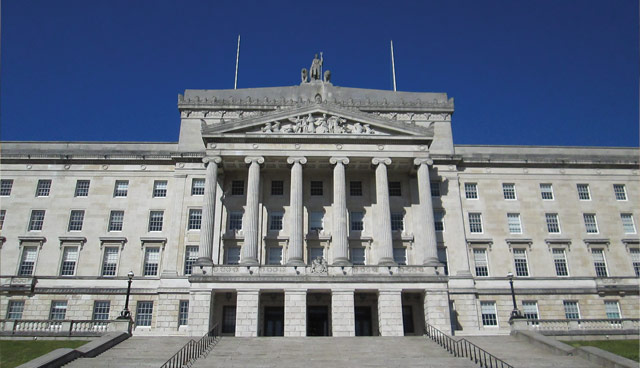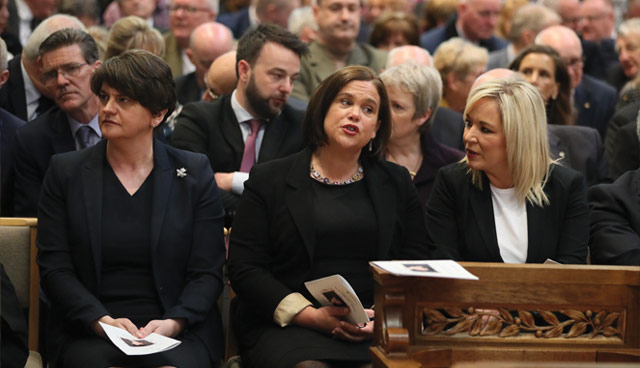A bleak outlook for power-sharing in the North

As parties in the North engage in talks in an attempt to restore power-sharing at Stormont, David Whelan outlines seven major factors that do not bode well for a positive outcome.
Over two years since the collapse of Stormont and over a year on from an ‘accommodation’ between Sinn Féin and the DUP was disregarded, the North’s parties are once again engaged in talks to restore power-sharing. However, much like previous attempts, the prospect of a successful outcome appears bleak given the volume and breadth of issues that continue to separate the two largest parties.
Brexit
The first and most obvious is that of Brexit. The parties are attempting to find agreement on the future direction of the North while pulling in completely separate directions on what Brexit means for the region. The Brexit problem is multi-faceted. On one-hand there is the constitutional issue. While both Sinn Féin and the DUP have voiced their opposition to a hard Brexit, Sinn Féin see opportunity in turning an already evolving all-island conversation into something more concrete and the DUP see an opportunity to create further separation between north and south.
On the other hand, Brexit poses an existential threat to the future of the North. Undoubtedly, a Brexit of any kind will be economically detrimental to Northern Ireland. However, The DUP has placed the union above all else and their partnership with the Conservatives, the party driving a disastrous Brexit process, has led to fraught exchanges between remain and leave supporters in the North. Vastly different opinions on the future of the economy, the Good Friday Agreement and the border can not be set aside to establish an Executive that will then be tasked with dealing with these issues.
Election
The second factor is that of recent local and European elections. Question marks have been raised about the decision by the British and Irish governments to convene “short and focused” talks in a month when all parties are battling it out for votes on two fronts. Agreements require compromise by nature and in a month where parties have been canvassing voters and delivering their elections manifesto, room for compromise would appear small.
Deal disaster
The deal that nearly happened in February 2018 took many people by surprise but in the end, it didn’t get over the line. The parties, and their voting base have very different interpretations about who gained the most from the prospective agreement and public reaction to that failed deal is a third factor. The DUP went so far as to deny that a deal had even been drafted, a copy of which was later leaked, after the party allegedly faced a backlash from its grassroots. However, there was equally anger on the nationalist side with what Sinn Féin had agreed to, once the details of the text had been publicised.
Having enhanced their votes in the snap election, called following the resignation of the late Martin McGuinness in January 2017, on a campaign of ‘no return to the status quo’, the party softened on numerous issues, despite the talks being largely on the basis of implementing existing agreements. To name a few, there was no planned legislation to reform the petition of concern, simply an ad hoc committee to review it. No Irish Language Act was drafted. Only broad principles were outlined and no date was set. The inclusion of an Irish Language Commissioner was portrayed as a positive but the text confirmed that guidance to the commissioner would have to be approved by a First and deputy First Minister, one of whom would have been the DUP. Another ad hoc committee was to consider the creation of a Bill of Rights. Again, no date was established. There was also omission of any specific legislation on equal marriage. Sinn Féin will need much more solid changes under any new agreement if they are to appease their base and, at the same time, the DUP will be weary of making the same mistakes that saw their own support raise opposition.
Clueless Secretary of State
The fourth factor is the role of the British Secretary of State (SoS) Karen Bradley. The SoS’s reputation has plummeted in the eyes of civic and political society since taking up her role. The criticism largely centres on moves, dodges and weaves to keep Northern Ireland on life-support rather than taking actions to resolve the political crisis. However, a series of gaffs highlighting a lack of understanding of Northern Ireland’s troubled past and civic make-up have not helped. Based on Bradley’s previous attempts to resolve the stalemate, including a refusal to consider an independent arbitrator, there is little hope for the prospect of her brokering a fresh deal.

Legacy
Bradley was forced to apologise recently after stating in the House of Commons her belief that deaths caused by military and the police during the Troubles were not crimes. Legacy remains a divisive issue in the North were there is still no consensus on how to move forward and is factor number five. A consultation by the NIO on addressing the past closed in October 2018 but no mechanism is in place to deliver on its findings. At the same time, it appears that both parties have been negotiating separately with the British Government around the inclusion or omission of a statute of limitations on security force prosecutions. The British Government will again come under pressure during the current round of talks and will not be able to appease both sides.
RHI report
Factor six is the impending report by Sir Patrick Coghlin on the Renewable Heat Incentive (RHI) scandal, the latest in a list of DUP-associated scandals that includes the likes of the Red Sky debacle and the NAMA’s Project Eagle saga. Coghlin has indicated “quite significant criticism” of individuals to be included and it’s highly unlikely that any party will commit to entering government with the DUP until the details of the report have been released. A spotlight shone on the party’s internal operations during previous Executives was not only the source of criticism of their then partners in government but were also on full view to the public and this will increase the pressure on the North’s parties not to return to Stormont without significant changes to party practice guaranteed.
The Arlene factor
Lastly, the cumulation of all of the above have led some to believe that Arlene Foster, who signed off the RHI scheme as then DETI Minister, is under pressure from within her own party to step aside with the report imminent. However, nothing could be further from the truth. If there is any dissention around Foster continuing to lead the party from within her ranks, then it is not manifested to the public arena. In fact, calls to remove herself as First Minister designate appeared to only galvanise further support for her from within the party, while her demeanour continues to play badly with northern nationalists.
The closeness to a deal back in February 2018 would suggest that Sinn Féin are willing to ignore their previous claim that they would not enter government with Foster as First Minister. However, relations have soured even further since then, particularly given the DUP’s confidence and supply agreement with the Conservatives. Any attempt by Sinn Féin to seek changes to Foster’s current role will be met with a solid wall of DUP resistance.





